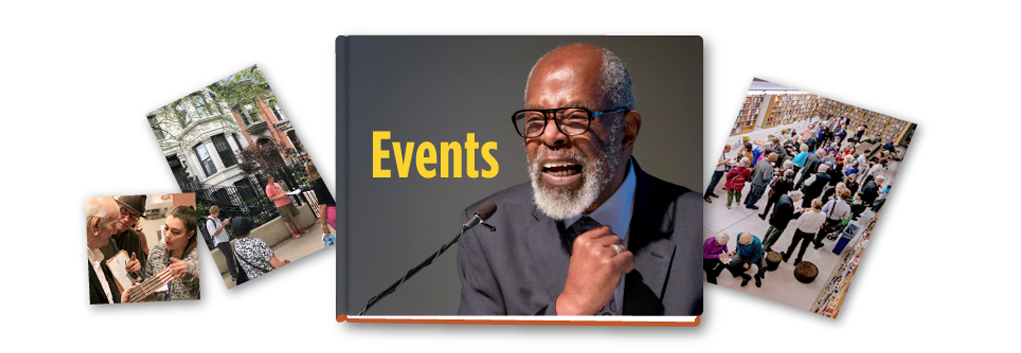A Whole Wide World of Poetry: A Conversation with Mark Fishbein About the Place of Global Poetry in Chicago
Monday, November 11, 2024
by Richae Mastrolonardo
When I log on to Zoom, it’s a Saturday morning, and I’m instantly greeted by enthusiastic questions from Mark Fishbein: “Tell me about you, what are you studying?” In an online world, it can feel hard to forge any kind of real connection, but this isn’t an issue for Fishbein. Before I ask any questions, we spend the first few minutes talking about Chicago. Though soft-spoken, he’s filled with spirit and passion for what he does. And he does a lot in the literary arena: he’s a writer, poet, workshop instructor, and founding member of Poetry Global Network. This past October 25th, he was also the organizer of the global poetry showcase, Afterwords Chicago, which took place at After-words Bookstore.
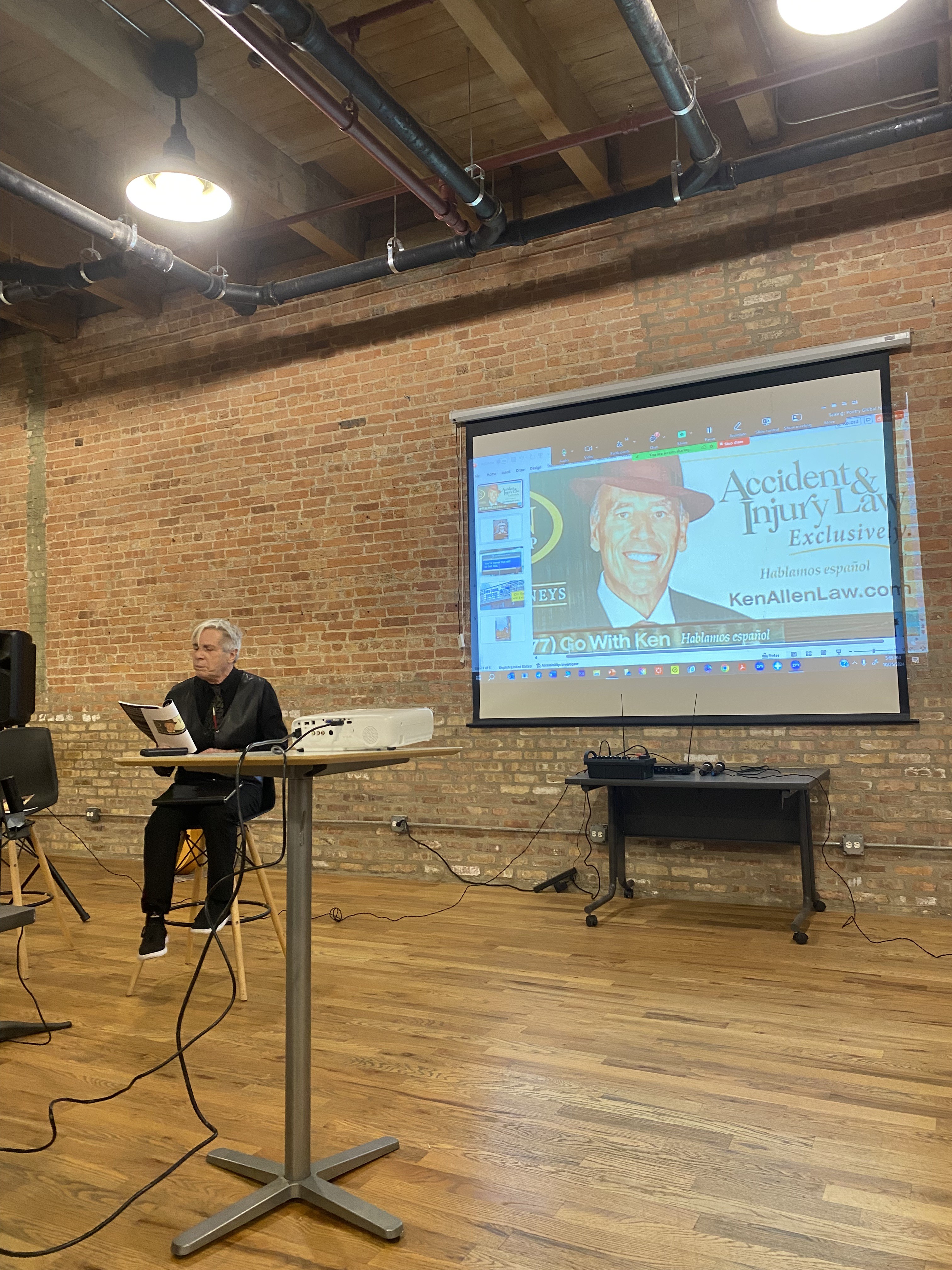
After-words has been a staple of the independent bookstore scene in Chicago since they opened in 1997. With two floors full of titles, it’s a natural hub for poets and readers to gather. Their reading room was also set up with a big screen and projector: an essential part of this event. Afterwords Chicago is what Fishbein calls a hybrid style poetry event, connecting in person readers with ones online. The showcase featured unique headliners with ties to Malaysia, the Philippines, Singapore, and the United States. This included some of Chicago’s very own, such as Virginia Bell, Andy Holsteen, Marcy Rae Henry, Luz Magdaleno Flores, Wesley Kendall, and of course, Fishbein. Not only did he read, but he also hosted the event, introducing the featured readers and the open mic that followed. It seems only fitting I speak with Fishbein over Zoom: the place that started it all for Poetry Global Network.
Fishbein helped to create the Poetry Global Network in 2021 as a product of the Covid-19 pandemic. With minimal social interaction available, the goal was to find a way for poets to connect using online resources. He is a Chicago resident, finishing an MFA at Columbia College this spring. He has multiple published books, his most recent being an ekphrastic book Billboards, Murals, Signs & Street Banners of Chicago (Shy City House Press, 2024). He also reviewed the Chicago Literary Hall of Fame’s Wherever I’m At: An Anthology of Chicago Poetry for American Book Review.
Chicago poets are diverse and talented, and Wherever I’m At is a prime example of this. It features over 160 poets and artists, all with ties to Chicago. From an anthology of this magnitude alone, you can see how vibrant Chicago’s poetry scene is. We’re the home of the Poetry Foundation, the Chicago Poetry Center, poetry workshop programs, poetry magazines, and countless live readings–famously, the Green Mill slam. In other words, Chicago’s a place for poetry. But how global is it? It seems that there’s a small opening, in our vast landscape of poets, for something that brings people from across the world together in a new kind of way. After attending the Afterwords Chicago event, it’s clear that there’s something special about the place of global poetry in this city and the way we can use our online resources to foster it.
In our initial conversation, you mentioned how you joined the online Zoom poetry scene during Covid and saw poets attending a whole new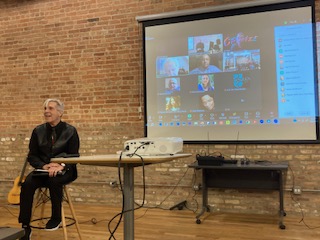 style of events that could now have global audiences. It was from this experience that you and others decided to create an online poetry resource that became Poetry Global Network. What kind of events were you a part of online during Covid and what was the engagement like over Zoom? What was the moment that finally made you realize you could make something like this work for Poetry Global Network?
style of events that could now have global audiences. It was from this experience that you and others decided to create an online poetry resource that became Poetry Global Network. What kind of events were you a part of online during Covid and what was the engagement like over Zoom? What was the moment that finally made you realize you could make something like this work for Poetry Global Network?
Before the pandemic, I was living in Washington D.C. and there was tons of stuff going on with poetry. Almost every bookstore had a reading every so often, and there were the Smithsonian readings…It became an active, live thing with all kinds of events happening. Then Covid hit and everything stopped. During this time, I still wanted to meet and connect with other poets. I just wanted to roam around the Eventbrite Zoom poetry scene. I found some others who did too– of course, in a room of two-dimensional poets all doing an open mic, you’re going to find such a variety of voices and talents. I met up with a couple poets, connected, and held some private meetings. We all decided, “you know what, why don’t we form a group?”
We found that England is the best country to start a nonprofit corporation. So, we did, and we became the Poetry Global Network. We have five people on the executive committee, and there are people involved from around the world that join us and help whenever they can. We started doing the “news report–what’s happening in poetry?” There was so much there and nowhere to find it. We tried a couple of other interview programs. We continued this way to host open mics, workshops, and themed events, and gained several hundred followers.
Why was the global element of this important for you to bring to Chicago?
When Covid ended, the whole poetry scene had changed, and it hasn’t been brought back to where it used to be by any means. The number of readings that used to be in Chicago were numerous. There’s just very little happening anymore in what I would consider to be a main city of poetry for the United States. Chicago has The Poetry Foundation, Poetry magazine, and a slew of higher education facilities. At the time, it seemed like there was nothing going on compared to New York, San Francisco, or Washington D.C. When I moved here in late 2022, I visited the After-words Bookstore and saw their amazing studio reception space. I thought “wow, maybe we can do an event here.”
It was really nice to be in the venue space last night and to see everyone. You talked a little bit about how you came to collaborate with After-words for this event after speaking to the store’s owner, Beverly. Aside from the back room and space they have, was there anything else that piqued your interest? How has it been working with them for the past three years?
This event is the only time that I collaborate with After-words. I go in there to shop every so often. It’s nice actually, it’s one of the few bookstores in Chicago where you walk in and the poetry section is right there.
I noticed that too.
You know, I’ve been to quite a few bookstores in Chicago, trying to peddle my books, and it’s either difficult to find a poetry section, or they don’t really have one. Maybe it’s just a shelf with Yeats or Whitman, or a bestseller like Rupi Kaur.
Well, there was a really unique and wide-ranging selection of readers at this event, including some of Chicago’s own talent and readers from Poetry Global Network. I’m curious to know how they were chosen?
The online poets were no problem. I had about 50 good ones I knew online to choose from. Getting poets to read live wasn’t as easy. I just moved here three years ago from New York, and I lived in D.C. for a while. I just don’t have the same kind of poetry base that I did in D.C. But I reached out to people like Don Evans [from the Chicago Literary Hall of Fame] for recommendations. I met somebody at the Chicago Poetry Center. So, I got some names and looked through their bios to create a list of featured readers.
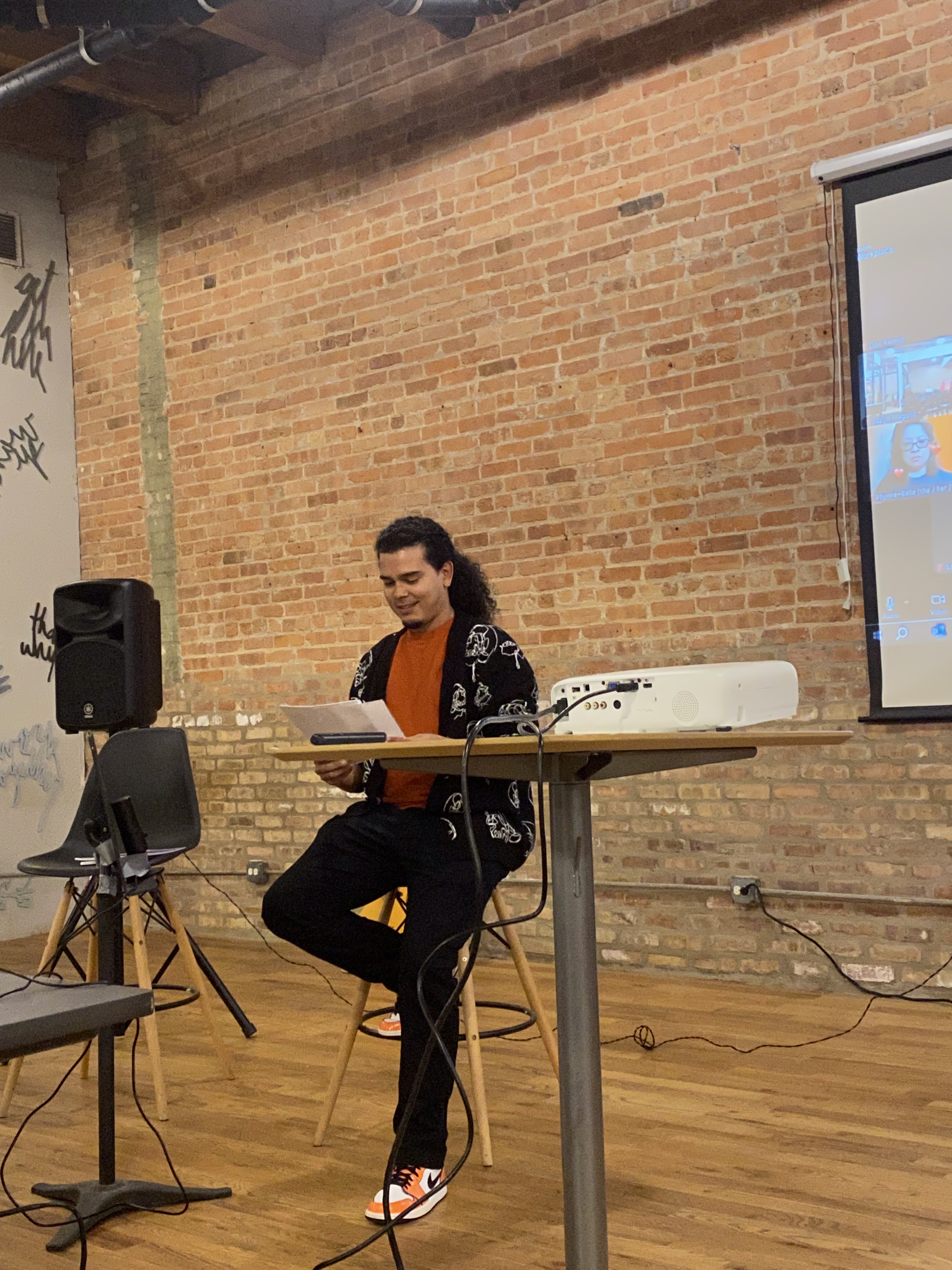
They covered so many different topics throughout the night, but I thought it was interesting to see that many of them discussed their backgrounds. I saw a similarity between the first two readers Noel Quiñones and Jalen Eutsey. They’re from two cities across the country (New York and Miami) but they used a similar metaphor to describe being a child that wants to fly, filled with youth. That was just a fun little connection, but it made me wonder if you saw any uniting factor or common thread between the work of these poets?
There were very different voices. There was the lyrical style that Mona Zamfirescu and Neil Daswani did, combining music and images for beautiful nature poetry. Phynne~Belle is a beautiful reader, she has a beautiful voice, and her work is very personal. My poems were totally different. It was more political. So, there weren’t too many themes. I find if you try to compare anyone to C.P. MAZE, you’ll have a hard time. He’s a wonderful individual, with such a unique style. Even Mike, one of the readers who came to the open mic afterwards, was reading Origami poetry. It was very interesting and diverse. It’s one of the things I like about it.
People get to hear some of everything from voices with different backgrounds.
And poetry’s not only about death.
Exactly. Since this is the third year you’ve held this event, what have you learned along the way, and what are the biggest changes you’ve noticed since the first event you held?
Every year we try to get a little better. I want to get better with the camera and the mic. I play guitar and wanted to introduce the event playing guitar, but the Zoom audio wasn’t working right, so we changed the plan. But other than technical stuff, my hope is that next year we keep growing. The poetry world is kind of like the WNBA. It takes one star, and all of a sudden, the league is on fire. We need that Caitlin Clark. I'd love to feature that one Pulitzer winner or poet laureate. All of a sudden, a larger group of poets will perk up their ears and say “maybe this is an event to go to.”
I’m hoping that as we continue over the next year or two, this will become a yearly event. Every October, there will be the After-words Bookstore poetry event. As far as I know, there’s no hybrid event that happens here now, and I think Chicago needs it. I’m hoping to establish this as a norm at that store and make it a hub.
I’m hoping it can really become a part of the new type of presentation of poetry. It’s not just a live venue, but there’s a screen and anybody can come to the poetry reading [in person or online.] I think that’s a positive way of moving forward. The hybrid element is really important. One of the things I’ve discovered personally is the “Share Screen.” Julian Matthews used it to show his poems as he reads them. I started doing this exclusively. I’ve held a monthly Share Screen poetry event, Planet Poetry 28, for 4 years now. It has been called the most sophisticated Zoom poetry event by many poets. And of course, online you don’t always have the cameras on, the eye contact, the same presence. That’s why it’s so magical to be live too.
You mentioned Julian Matthews and the share screen. There were some unique features of this reading, like that, which stood out to me as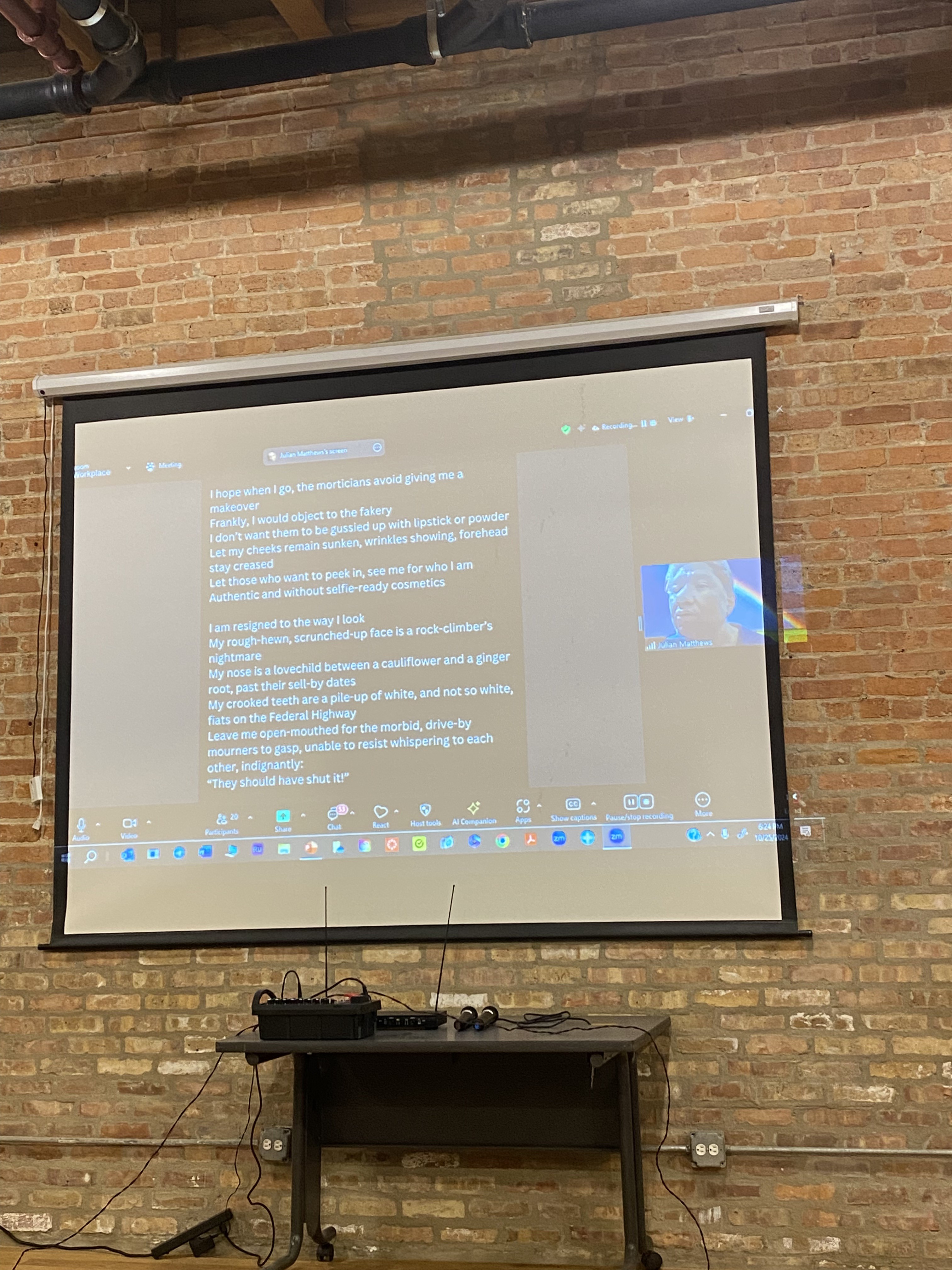 only being possible using online resources. Another feature was the Zoom chat section chiming off during the readings. People watching on Zoom would write down lines that had struck them or stuck with them, so while I was watching the reader, I could also see some of their lines pop up.
only being possible using online resources. Another feature was the Zoom chat section chiming off during the readings. People watching on Zoom would write down lines that had struck them or stuck with them, so while I was watching the reader, I could also see some of their lines pop up.
That’s a nice thing. That’s part of what the Zoom scene does. You’ve got the chat going on, and when readers come on, people will type things like “he’s here!” You can support people like that.
While doing some research about this event and for this interview I read something you had included on the Poetry Global Network website: [as poets] “...we are special; the unacknowledged legislators of the world.” I think that’s a really interesting idea in this context of poetry having a global reach. In other words: what does it mean to be an unacknowledged legislator? Across cultures?
That's been a popularized quote for quite some time by Percy Bysshe Shelley. It reminds me of Aristotle. He saw that the wisdom and the truth of poetry was a legitimate truth. He saw that it had political and sociological overtones to it. There’s a certain compassion that exists in poetry that makes us the unacknowledged legislators of the world because we acknowledge things that politics do not: struggles in life, facing certain realities about our instincts and our griefs. There is something very internationally connected about this.
Americans don’t read much international literature in general. We uniquely speak one language and have this idea of “one” culture. But in Europe and places around the world, you’ll see half the books in a bookstore are in translation. It’s important for us to keep expanding and keep global. If we can continue to keep global and continue to build this poetry global movement online and in every which way we do, we might help move the dial just a little bit closer toward some type of a sane society. We can only hope that it can help create somewhat of a gathering space.
Often the people that follow us at Poetry Global Network are like the poets you saw at this event. There’s a wide range– some are award winners, some have been published in major magazines, some are just good poets. It’s a nice crowd. It’s not a snobby poet crowd, like you can find sometimes. The accessibility of the poetry is important. For example, my grandson was there, with my wife and my sons. They’re not poets, and they don’t know much about poetry, but they found something there last night which connected them.
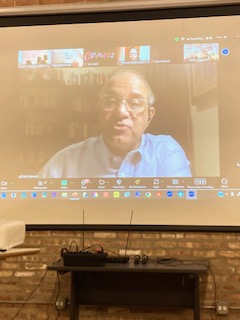
That’s lovely. There is definitely something rare and special about this event and the idea of global poetry. I never would have been able to hear a reader live from Singapore, like Neil Daswani, if not for this Zoom hybrid style.
That’s what thrills me. I go to a poetry group called Unmesh Life. It’s a group based in India, but also other parts of the world, and their poetry is just wonderful. The connection between us is so real.
That’s one of the nicest things. This connection of poets has never happened before, not in this way. The fact that we can find each other–that I found LKN [of Poetry Global Network], for example, and all of these people. Even though we’ve never touched each other, over these years, through poetry, we know each other's souls.
Richae Mastrolonardo is a senior in English at DePaul University. In and outside of the classroom, she loves to read and write poetry. This winter, she will be an editor for the DePaul literary magazine Crook & Folly. She currently serves as a Chicago Literary Hall of Fame intern.


